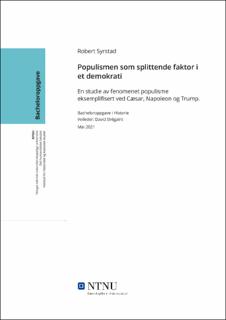| dc.contributor.advisor | Brégaint, David | |
| dc.contributor.author | Syrstad, Robert | |
| dc.date.accessioned | 2021-09-13T16:08:34Z | |
| dc.date.available | 2021-09-13T16:08:34Z | |
| dc.date.issued | 2021 | |
| dc.identifier | no.ntnu:inspera:80115080:46795255 | |
| dc.identifier.uri | https://hdl.handle.net/11250/2775737 | |
| dc.description.abstract | Populisme fungerer som en kraftfull politisk maktfaktor, noe vi ofte ser hos demagoger som forsøker å posisjonere seg i et demokratisk samfunn. Det finnes riktignok ingen enhetlige teorier om hva fenomenet populisme er, men begrepet vil bli forsøkt beskrevet gjennom å se på hva statsvitere og historikere sier om fenomenet. Populismen beskrives i hovedsak som retorikk rettet mot politiske motstandere og andre kritikere fra media og frivillige organisasjoner, hvor populisten fremstilles som den eneste som representerer det forente folket på en troverdig måte ovenfor andre folkegrupper som forsøker å bryte ned samfunnsordenen. Oppgaven belyser på hvilken måte populisme operasjonaliseres hos politiske aktører som Julius Cæsar, Napoleon Bonaparte og Donald Trump, og om de faktisk anvender populistiske strategier for å vinne- og beholde makten. Det redegjøres for populismens negative konsekvenser ovenfor demokratiets etablerte institusjoner og verdier. Populistiske strategier kan utfordre lovgivende, utøvende og dømmende demokratiske institusjoner, og faren for at dette skjer blir større jo lengre en autoritær populist eller en demagog sitter ved makten. | |
| dc.description.abstract | Populism acts as a powerful political power factor, something we often see in demagogs trying to position themselves in a democratic society. Although there are no uniform theories about what the phenomenon of populism is, the concept will be tried by looking at what political scientists and historians say about the phenomenon. Populism is mainly described as rhetoric directed at political opponents and other critics from the media and NGOs, where the populist is portrayed as the only one who represents the united people in a credible way to other ethnic groups who try to break down the social order. The thesis sheds light on the way in which populism is operationalized by political actors such as Julius Caesar, Napoleon Bonaparte and Donald Trump, and whether they use populist strategies to gain and retain power. The negative consequences of populism in relation to democracy's established institutions and values are explained. Populist strategies can challenge legislative, executive and judicial democratic institutions, and the risk of this happening increases the longer an authoritarian populist or a demagog is in power. | |
| dc.language | nob | |
| dc.publisher | NTNU | |
| dc.title | Populismen som splittende faktor i et demokrati | |
| dc.type | Bachelor thesis | |
